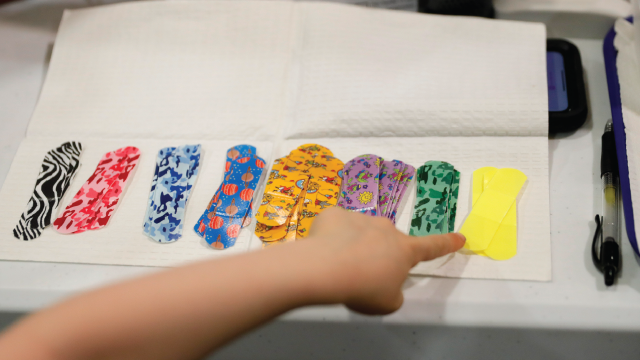
Key takeaways
- A majority of Americans (63%) are highly confident that childhood vaccines are effective at preventing serious illness. And majorities say these vaccines protect both vaccinated children (69%) and the wider community (65%), though larger shares of Democrats than Republicans hold these views.
- By comparison, smaller shares of U.S. adults – and Republicans in particular – are extremely or very confident that childhood vaccines have gotten enough safety testing (53%) or that the vaccine schedule is safe (51%).
- Overwhelming majorities of both Democrats (92%) and Republicans (78%) say the benefits of the measles, mumps and rubella (MMR) vaccine outweigh the risks. Still, among Republicans, this share is down from 91% in 2016.
- Republican support for MMR vaccine school requirements also continues to slip, from 79% in 2019 to 52% today.
- Democrats are far more likely than Republicans to say medical scientists should have a major role in childhood vaccine policy decisions. In turn, Republicans are much more likely than Democrats to say parents of young children should have a major role.
In a year that has seen evolving federal vaccine recommendations and historic measles outbreaks, 63% of Americans have high confidence in the effectiveness of childhood vaccines. But trust dips somewhat when it comes to their safety testing (53%) and schedule (51%). This drop-off is especially pronounced among Republicans.
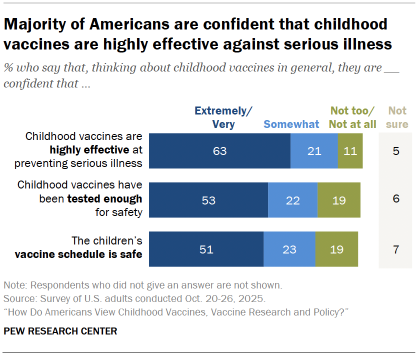
A new Pew Research Center survey asked Americans about their views on childhood vaccines, vaccine research and related policy. This study builds on the Center’s broader work tracking Americans’ attitudes about vaccines, and trust in science. This analysis covers findings on the following topics:
- Confidence in childhood vaccine effectiveness and safety
- Views of MMR vaccine safety and school requirements
- What influences medical scientists’ research on childhood vaccines?
- Who should influence childhood vaccine policy?
- To what extent do childhood vaccines protect children and communities?
Related: How have changes to CDC recommendations influenced Americans’ COVID-19 vaccine decisions?
Confidence in childhood vaccine effectiveness and safety
A majority of Americans (63%) are extremely or very confident that childhood vaccines are highly effective at preventing serious illness, with Democrats and Democrat-leaners much more likely than Republicans and Republican-leaners to express a high level of confidence (80% vs. 48%).
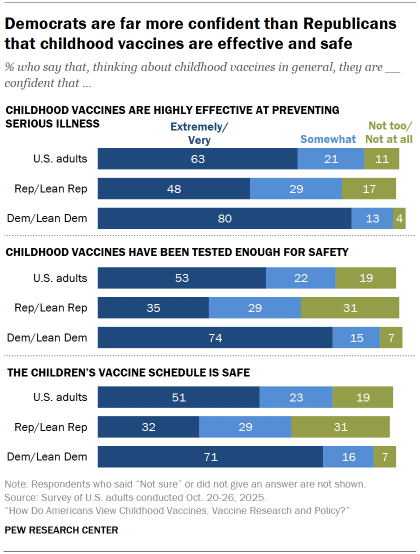
Overall, there’s somewhat less certainty, and more uncertainty, about these vaccines’ safety testing and schedule – that is, the timing and number of vaccines children get. About half of Americans are extremely or very confident that childhood vaccines have been tested enough for safety (53%) or that the schedule is safe (51%). On the flip side, about one-in-five are not too or not at all confident in either.
This doubt is heavily driven by Republicans, who are divided between high and low confidence in childhood vaccine safety. For instance, 32% of Republicans have high confidence in the vaccine schedule’s safety, and 31% have low confidence. Democrats are much more aligned: 71% have high confidence and 7% have low confidence in the schedule’s safety.
Views by demographic group
- Age: Across all three vaccine dimensions we asked about, older adults are somewhat more likely than younger ones to trust childhood vaccines. For example, 63% of people ages 65 and older express high confidence in vaccine safety testing, compared with about half of adults under 50 (49%).
- Race and ethnicity: Asian (70%) and White (66%) adults are more likely to be highly confident childhood vaccines are effective against serious illness, compared with Black (54%) and Hispanic (58%) adults. When it comes to trust in their safety testing and schedule, Asian adults are more likely than other racial or ethnic groups to be extremely or very confident.
- Education: Adults with more education are more likely than those with less education to express trust in the effectiveness, safety and schedule of childhood vaccines. For example, two-thirds of adults with a postgraduate degree say they are highly confident in the vaccine schedule, compared with less than half of those who have a high school education or less (44%).
But low confidence in vaccine safety testing and the schedule is not limited to adults with a high school degree or less. For example, similar shares of Americans with a four-year college degree (19%), some college (21%) or high school degree or less (19%) are not too or not at all confident in the vaccine schedule’s safety.
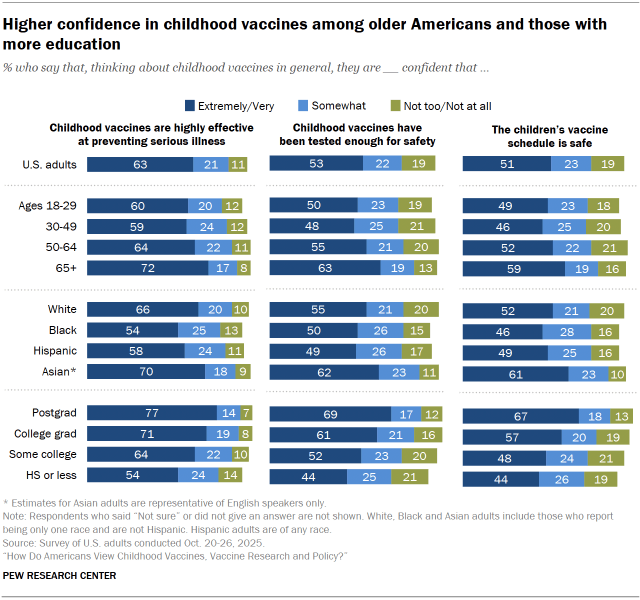
Parents of children under age 18, who are in the thick of childhood vaccine decisions, are slightly more likely than adults without minor children to have low confidence in the effectiveness, safety testing and schedule of these vaccines. For example, 24% of parents have low confidence in the safety of the childhood vaccine schedule, compared with 17% of adults who don’t have minor children.
For more on parents’ views on childhood vaccines, refer to this additional analysis: Parents’ confidence in childhood vaccine effectiveness, safety testing and schedule
Views of MMR vaccine safety and school requirements
U.S. measles cases in 2025 reached their highest level in more than two decades, with the vast majority of reported cases occurring among unvaccinated people. The measles, mumps and rubella (MMR) vaccine has been part of routine child immunization in the United States since the 1970s. But the share of children receiving it has dipped in recent years, according to CDC data.
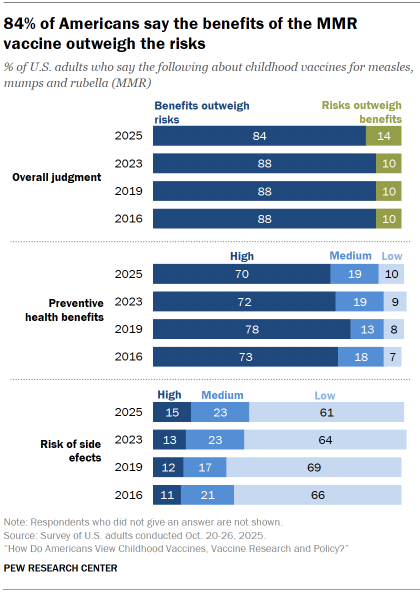
Still, Americans’ positive views on the MMR vaccine have largely held since we first started asking about this in 2016. A solid majority (84%) says its benefits outweigh its risks. And seven-in-ten say the vaccine’s preventative health benefits are high or very high, while just 15% say the same about the risk of side effects.
Overwhelming majorities of both Democrats (92%) and Republicans (78%) say that the MMR vaccine’s benefits outweigh its risks. Yet Republicans are more likely than Democrats to rate the risk of side effects as high (20% vs. 9%) and less likely to say the preventative health benefits are high (62% vs. 80%).
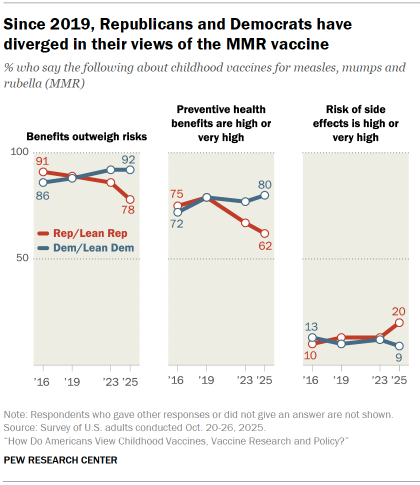
And Republicans have grown less positive about the MMR vaccine over time. In 2016, 75% of Republicans rated its preventive health benefits of highly, compared with 62% today.
Refer to the appendix for views of the MMR vaccine by demographic group.
School MMR requirements
The MMR vaccine is currently required for children to enter public school in every state, but school vaccine policies have been a flashpoint of debate as Florida plans to eliminate school vaccine requirements.
Since 2016, a vast majority of U.S. adults have said healthy children should be required to get the vaccine to attend public school because of the potential risks for others when children are not vaccinated. But support for school MMR requirements dropped from 82% in 2019 to 69% in 2025.
This decline is largely because of a steep slide in support among Republicans. In 2019, before the COVID-19 pandemic, 79% of Republicans said healthy children should be required to get the MMR vaccine to attend school. This share sunk to 57% in 2023, then to 52% in 2025. In contrast, Democrats’ views on school MMR requirements have remained stable, with solid majority support.
For views on school vaccine requirements by demographic group, refer to the appendix.
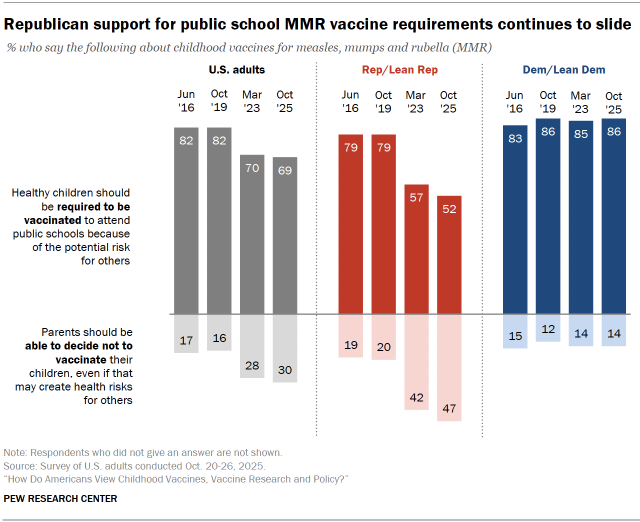
What influences medical scientists’ research on childhood vaccines?
Beyond trust in childhood vaccines, this survey also looks at Americans’ impressions of the scientists who study them. Previous Center research has found that U.S. adults largely trust medical scientists to act in the public’s interest.
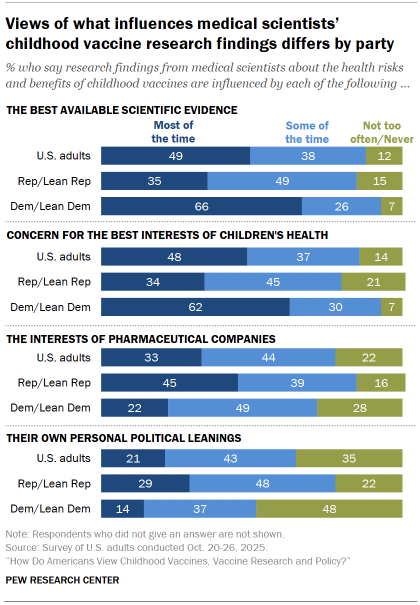
When it comes to research on childhood vaccine risks and benefits, a vast majority (87%) say medical scientists’ findings are influenced by the best available scientific evidence either most of the time (49%) or some of the time (38%).
Similarly, 85% say their research is influenced by concern for the best interests of children’s health at least some of the time.
Majorities also see the interests of pharmaceutical companies (77%) and scientists’ own political leanings (64%) as influential at least some of the time. Smaller shares say these factors influence childhood vaccine research most of the time, compared with the role of scientific evidence and concern for children’s health.
Partisans disagree about how often these factors influence medical scientists’ research:
- Democrats are much more likely than Republicans to say scientists are influenced most of the time by the best available scientific evidence (66% vs. 35%) and by the best interests of children’s health (62% vs. 34%).
- But Republicans are more likely than Democrats to say scientists are influenced most of the time by the interests of pharmaceutical companies (45% vs. 22%) or by their own political leanings (29% vs. 14%). The shares of Republicans saying medical scientists are influenced this much by concern for children and the best scientific evidence have dropped since 2016 (-18 and -13 percentage points, respectively).
Who should influence childhood vaccine policy?
Many groups – from scientists to parents to government and heads of industry – have a stake in childhood vaccine policy. How much influence do Americans think they should have?
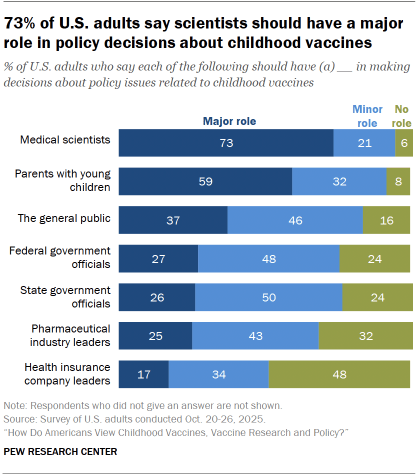
Americans largely say medical scientists should play a major role in childhood vaccine policy. Roughly three-quarters say scientists should have a major role in these decisions.
A smaller majority (59%) see a major role for parents of young children in vaccine policy decisions.
Around four-in-ten or fewer say the general public (37%), federal officials (27%), state officials (26%), pharmaceutical leaders (25%) or health insurance providers (17%) should play a major role.
About half of Americans say health insurance company leaders should have no role in making decisions on childhood vaccine policy.
Views by party
Previous Center work has found that Democrats are more likely than Republicans to support scientists playing an active role in policy debates about scientific issues. Similarly, a much larger share of Democrats (85%) than Republicans (62%) say medical scientists should have a major role in decisions about childhood vaccine policy.
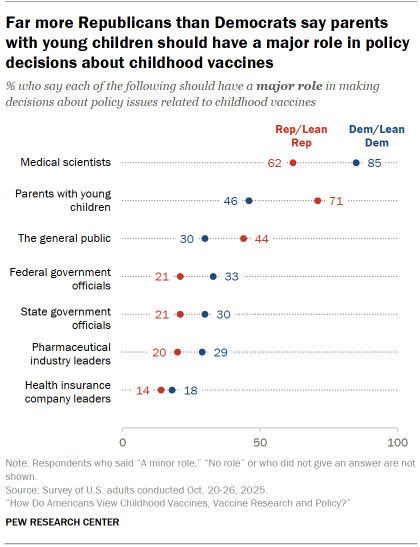
Views are reversed when it comes to the role of parents with young children. Republicans are far more likely than Democrats to say parents of young children should have a major role in policy decisions about childhood vaccines (71% vs. 46%).
There are smaller partisan differences for the other groups we asked about. For example, 44% of Republicans say the general public should play a major role, compared with 30% of Democrats. And small shares in both parties say health insurance company leaders should have a major role (14% Republicans and 18% Democrats).
Views by education
Adults with more education are more likely to say medical scientists should have a major role in childhood vaccine policy decisions. Americans with a postgraduate degree (86%) overwhelmingly hold this view, compared with a smaller majority among those who have a high school education or less (65%).
Adults with a high school education or less are more likely than those with at least a four-year college degree to support a major role for parents with young children (68% vs. 49%).
To what extent do childhood vaccines protect children and communities?
Vaccines can protect a vaccinated child from serious illness, but broad vaccine coverage also protects the wider community – a concept often called “herd immunity.”
Mirroring their overall confidence in childhood vaccine effectiveness, majorities of U.S. adults see both of these preventive qualities. About seven-in-ten say childhood vaccines help prevent serious illness among vaccinated children a great deal or quite a bit. A similar share (65%) say the same about vaccines protecting everybody in the local community.
Both parties share these attitudes at least somewhat, though they are more common among Democrats than Republicans.
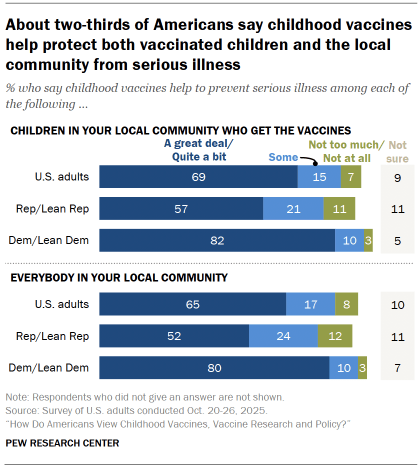
- Democrats overwhelmingly think childhood vaccines do a lot to prevent illness among children (82%) and across the local community (80%).
- Republicans’ views are more tepid: 57% say these vaccines do a lot to protect vaccinated children, while 52% say they do a lot to protect the community. Roughly one-in-ten say childhood vaccines do not help much or at all on these fronts.
Older adults and those with more education are more likely than younger and those with less education to say childhood vaccines protect both vaccinated children and the broader community, though majorities across age and education groups still say this is the case.




